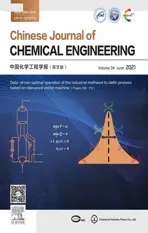Special issue on progress in advanced energy technologies and materials
2021-04-11WenjinDingXiaoleiFan
Wenjin Ding,Xiaolei Fan
1 Department of Thermal Process Technology,Institute of Engineering Thermodynamics,German Aerospace Center (DLR),Stuttgart,Germany
2 Department of Chemical Engineering and Analytical Science,School of Engineering,The University of Manchester,United Kingdom
This special issue of the Chinese Journal of Chemical Engineering(CJChE)concerns with the current progress in advanced energy technologies and materials related to chemical science and technology,especially the work in the field of renewable energy,energy storage,clean and efficient utilization of energy,aligning well to the scope of this Journal.
The world is moving towards a sustainable,clean and low-carbon futurevia‘Energy Transition’,i.e.,by replacing conventional fossil and nuclear energy with renewable energy and enabling clean and efficient utilization of energy.Being different from the conventional energy,many renewable energies,such as solar and wind energy,are abundant but intermittent,which require energy storage to supply dispatchable and low-cost power in the future energy system.Over the past years,significant R&D efforts have been dedicated to the development of the new technologies and materials for ‘Energy Transition’.Some of them showed promising performance and application potential at the laboratory scale.However,significant challenges still exist for their further exploration and exploitation towards practical applications at scales in the energy systems and industries,including:
• Economics– the emerging energy technologies and materials are still not cost-competitive compared to the conventional ones in the current energy system.Further research and development on levels of materials,key components and processes(or plants) are required to reduce their costs and improve their performance.
• Efficiency– their developments were mainly standalone,and accordingly,their efficiencies in the integrated whole processes under real conditions are still not clear,which require further investigation and optimization.
• Durability–they are mostly developed as the proof of concept at the laboratory scale.Therefore,the longevity and stability of the new developments need to be assessed fairly and thoroughly,especially in comparison with the current counterparts,vialong-term operation at pilot scale close to realistic conditions.
• Applicability– Their potential practical applications,considering either as the drop-in or new infrastructure scenarios,needs careful assessments based on the aspects above,as well as lifecycle and techno-economic assessments.
Seventeen papers are collected by this special issue with three of them on renewable energy[1–3],five on energy storage[4–8],three on clean utilization of energy[9–11]and six on efficient utilization of energy [12–17],showing the relevant developments to address the challenges above.Within them,three are topical reviews covering hydrogen storage in solid-state hydrides[4],synthetic strategies of hierarchical zeolites for clean utilization of fossil energy[9],and recent advances in non-thermal plasma(NTP)catalysis for efficient utilization of energy in chemical industries [17].The rest fourteen are research articles,which can be broadly categorized into advanced energy materials such as catalysts[2,3,10,15],electrodes[5] and energy storage materials[7,8],advanced energy components for process intensification such as advanced reactors[11,12,14,16],advanced energy processes or plants such as efficient biomass gasification [1],waste energy recovery from liquid air energy storage [6]and chemical analysis for energy-efficient chemical processes [13].
We very much hope that these articles are of use to all energy technologies and materials stakeholders and more broadly the whole energy community,including both academia and industry.
Finally,we would like to extend sincere thanks to all the colleagues,including the authors,reviewers,the Journal office team and the Editor-in-Chief of the Journal of Chinese Journal of Chemical Engineering for making this special issue possible.
Declaration of Competing Interest
The authors declare that they have no known competing financial interests or personal relationships that could have appeared to influence the work reported in this paper.
